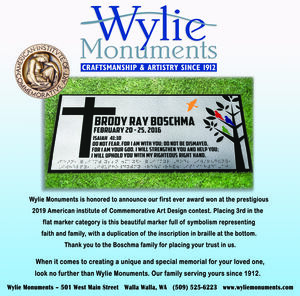Cementing Radioactive Wastes Could Save Billions
August 16, 2018
Since 2002, the U.S. Dept. of Energy has funded construction of a $17 billion project to encase radioactive wastes in solid glass logs. It is scheduled to start operations in 2022 and treat more than 56 million gallons of hazardous liquids which are stored in tanks on the Hanford Nuclear Reservation.
It is called vitrification, a process by which the State of Washington and federal government agreed in 1989. It is complicated, time consuming and very costly.
To speed up treatment and reduce costs, the federal government is testing a procedure at Hanford to harden the wastes with a concrete grouting. Washington State’s Dept. of Ecology sees funding of grouting as a diversion of funds and wants Congress to direct its appropriations solely toward vitrification. According to a recent article in the Tri-Cities Herald, the first phase of the demonstration project, grouting three gallons of waste held in Hanford’s underground tanks was successfully completed last December. The second phase calls for treating 2,000 gallons of tank waste and sending it to the Texas repository if Congress authorizes an additional $15 million.
The grouting demonstration project could free up additional space in double-shell tanks. The waste in 149 leak-prone, single-shell tanks is being emptied into 27 double-shell tanks, which are nearing capacity, the Herald reports.
Grouting has been used at Savannah River’s nuclear site in South Carolina. Unlike Washington State, South Carolina allowed grouting, and since then, four million gallons of Savannah River waste have been encased in concrete and safely stored.
The cost savings to taxpayers are huge. It estimated that grouting low-level radioactive waste at the Savannah River Site costs $153 per gallon, while the average cost of vitrifying low activity radioactive waste at Hanford is projected to be nearly $1,100 per gallon.
Washington State officials, in arguing for vitrification, point out Hanford poses a different set of problems than Savannah River. It has 56 million gallons of mixed radioactive and hazardous chemical waste which must be separated and treated.
The low-level vitrified nuclear waste is to be kept in water-tight concrete lined landfill compartments at Hanford. The high-level radioactive glass logs are scheduled to be shipped to Nevada.
The question is can some of the low-level wastes be treated more quickly and less costly by grouting? The goal is to keep those dangerous substances from leaking into the underground aquifer and nearby Columbia River.
With increasing pressures on federal funding, the U.S. Government Accountability Office is looking at alternative ways to pay for Hanford cleanup.
The federal budget deficit for fiscal year 2019 is projected to be $985 billion and our national debt is over $21 trillion and growing. Next year the U.S. government is spending $4.407 trillion, yet tax collections are pegged at $3.422 trillion.
A 2017 GAO report said that its expert panel had determined that grouting — mixing the waste into a concrete-like substance — would be less expensive than vitrifying some of the excess low-activity radioactive waste and allow the waste to be treated sooner.
Earlier assumptions about grout no longer appear to be accurate, particularly considering the dry climate of Hanford and that the disposal site for the waste at Hanford would be engineered to keep precipitation from infiltrating and leaching any waste from the disposal site, the GAO report said.
“One (GAO) expert said that if waste did leach from the landfill, it would take 2,000 years for it to enter the groundwater and then it would be highly diluted,” Herald reporter Annette Cary wrote.
Grouting appears to be a safe alternative which is less costly and more quickly accomplished. It is worthy of additional funding.
Don Brunell is a business analyst, writer and columnist. He recently retired as president of the Association of Washington Business, the state’s oldest and largest business organization, and now lives in Vancouver. He can be contacted at TheBrunells@msn.com.









Reader Comments(0)